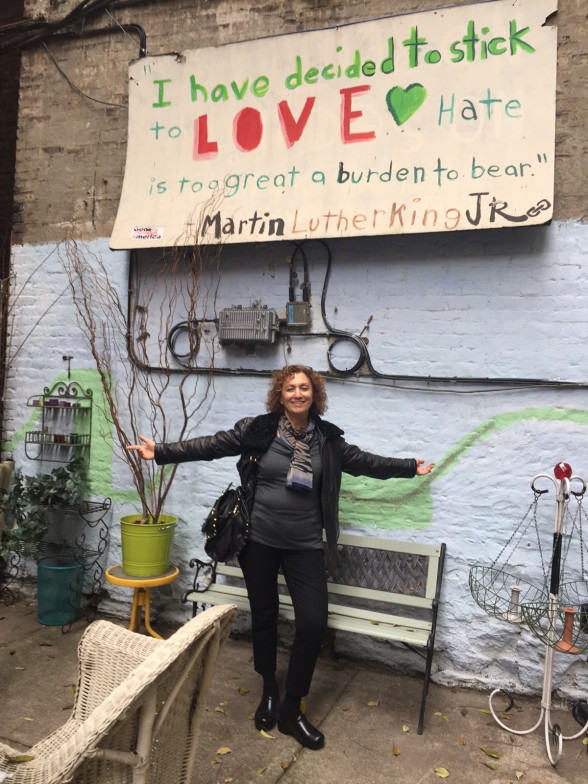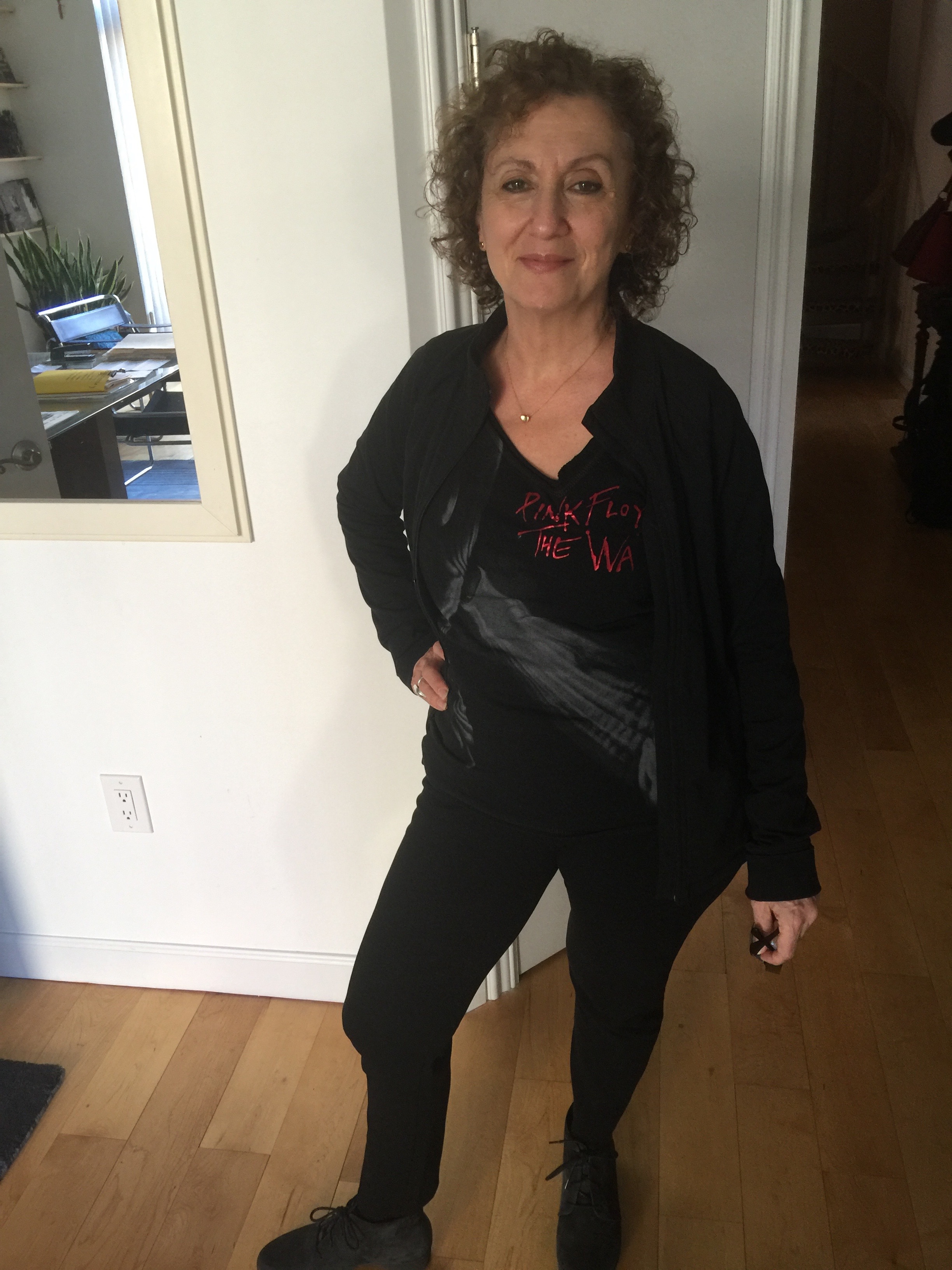 This week, we are introducing you to one of our newer DAI members, Minna Packer. She has written a very thoughtful article about dementia and PTSD, especially for our blog.
This week, we are introducing you to one of our newer DAI members, Minna Packer. She has written a very thoughtful article about dementia and PTSD, especially for our blog.
Thank you Minna for so openly sharing your story. We are all so much richer for having you in our lives, and definitely recommend you follow Minna's writings on her blog called Suddenly Mad: My Voyage Through Early Alzheimer's.
"I will begin by saying hello. I am adopting this salutation from the eloquent late Richard Taylor, who always began writing in this way. This is in reverence to the man who offered so much insight to those with dementia and caregivers throughout the world, and fought the battle against stigma that is still so prevalent.
Hello. I am here, and I am pleased to be able to write and tell you about myself. I am a woman, age 63 and I have been diagnosed with early onset Alzheimer's. My name is Minna Packer.
I'm an American, and now one of over 5 million people in the USA with this disease, and one of more than 47.5 million people in the world today who are living with dementia.
These are just statistics, numbers. Each of us has a story, that may help explain, elucidate, why we became ill. I try to tie together the threads of my own story, and though I am told not to look for explanations, my natural inclination is to probe. In my case, evidence suggests a link between developing post traumatic stress disorder early in my life, which put me at risk for dementia.
An increasing number of epidemiological studies have suggested that people who develop a neuropsychiatric condition such as PTSD in childhood, are also likely to develop Alzheimer's disease later in life. For instance, large studies in veterans in the United States have indicated that soldiers who had PTSD in their youth were twice as likely to develop Alzheimer's disease by the age of 65.
Researchers from the University Medical Center Goettingen in Germany have moved closer to understanding this mechanism, as they uncover a link between the two conditions. The hypothesis is that various risk factors eventually cause an aberrant activation of many genes that contribute to Alzheimer's disease. [1]
While I am not a war veteran, I am a child of Holocaust survivors. The children of traumatized people have long been known to be at an increased risk for PTSD, and mood and anxiety disorders. There has been evidence that many Holocaust survivors and their children show changes in the epigenetic regulation of genes. Epigenetic processes alter the expression of a gene. Animal studies have demonstrated that epigenetic changes from stress exposure are passed on to their offspring. [2]
My late parents were Jews from Poland and Russia, and their families were murdered and destroyed in the Shoah. I never knew my grandparents, uncles, aunts, or cousins. My dad was the sole survivor of his immediate family. I am named for his sister, Minna, murdered at Auschwitz at the age of 28 along with her 2 year old baby daughter, Pesa. My late mother was from an Orthodox Jewish family in Russia. Stalin considered Jews un-persons and had a particular hatred for Soviet Jews. What Stalin aimed to do was in large part completed by Hitler in the Soviet Union.
My parents would not have met or married had it not been for Hitler. They were ill suited. By the time I was born in New York City, a first generation American, my parents were a couple who were shell shocked. There was no extended family and no guidance for how to be a parent. In place of family photos, my parents dresser was covered with framed photos of relatives who had been murdered.
My father was at turns charming, but often full of rage. My mother was often morbidly depressed, hideously anxious and reactive. I believe they both suffered from post traumatic stress. They were ill equipped to be sane nurturing parents. Though I was a smart kid who excelled in school and was talented and ambitious, the emotional underpinning of being born into this particular family, with it's drama and abuse, did not provide the resilience needed a growing child.
That is the underpinning of my childhood history, and why I believe I was particularly vulnerable to PTSD.
The realization is that chronic diseases, including Alzheimer's disease have developmental origins. What I've learned since getting this disease is that PTSD makes one more vulnerable to Alzheimer's.
Originally I was diagnosed with major clinical depression and anxiety. What I really suffered from was PTSD. For years I was offered multiple antidepressants and benzodiazapines, medications which caused many side effects. Psychologists think that people do better combining therapy and medication. It's supposed to help the patient utilize what they learn in therapy more effectively in their lives. Actually what may be happening is the brain is being damaged. Acetylcholine the neurotransmitter needed by the brain to effectively transmit messages between synapses is destroyed.
A healthy brain rebounds from the assault of anticholinergic medications. A brain that is vulnerable may not have the capacity to do so. Paxil is a medication I was on for a long time. It is an anticholinergic which I have now found out, interferes with this neurotransmitter acetylcholine. I was put on benzodiazapines (sedatives) for anxiety. I used to have a perfectly normal sleep cycle. When the symptoms of anxiety and depression reared their ugly head I was put on new medications, including sedatives, even though I had a normal ability to fall asleep and stay asleep. I had what is called a paradoxical reaction to Klonopin, and my previously normal sleep cycle was destroyed. I went from being a 7 to 8 hour a night sleeper, to only being able to get 3-4 hours of broken sleep. Natural sleep is vital in clearing amyloid from the brain. Introducing anticholinergics into my system altered my autonomic nervous system. Plus Klonolin is highly addictive. Had I only known when I was prescribed benzodiazapines and SSRI's and SNRI's that there is now suspicion that these drugs can cause neurodegeneration, I would not have taken them.
What does this all have to with Hitler?
Trauma causes emotional dysfunction. The trauma of having ones family murdered during the Holocaust changed my late father's and late mother's nervous systems - their epigenetics, which was then passed down to me.
Today, 20% of the remaining Holocaust survivors have Alzheimer's in Israel. How many more are there who remain throughout the rest of the world? Now I am a child of deceased survivors who has this disease. The correlation between PTSD and trauma has been researched and evidenced. Now research points to PTSD and a vulnerability to getting Alzheimer's.
History is always disappearing, but it impacts our lives with long term consequences. My experience is that I was made vulnerable to PTSD as a child, and now I know that those who have it are more vulnerable to developing dementia later in their lives. Add to that a brain which has been subjected to anticholinergic medications repeatedly, that can and do kill brain cells.
As many of you know Alzheimer's is a very lonely disease. Connecting with others helps to keep us in the early stages."
Minna Packer © 2018
References
[1] Ana Sandoiu, 2017, How can PTSD trigger Alzheimer's disease? Study sheds light, MedicalNewsToday.
[2] Rachel Yehuda, Nikolaos P. Daskalakis, Linda M. Bierer, Heather N. Bader, Torsten Klengel, Florian Holsboer, and Elisabeth B. Binder, 2016, Trauma’s Epigenetic Fingerprint Observed in Children of Holocaust Survivors, Biological Psychiatry, Vol 80, issue 5 (2016), published by Elsevier.
Image source: Minna Packer

